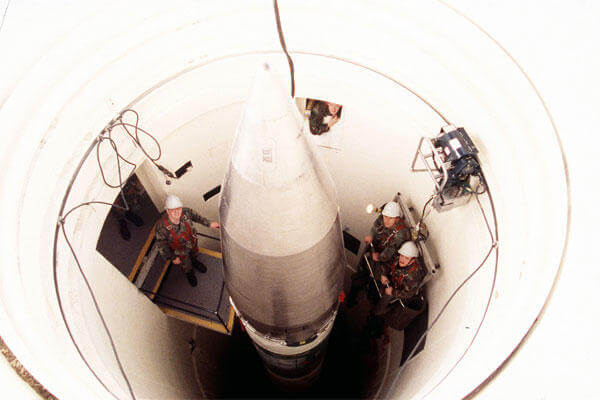Any U.S. moves to reduce the size of its nuclear arsenal from the current levels should be done bilaterally and in negotiations with Russia, the head of the U.S. Strategic Command told a congressional panel on Tuesday.
"I think in the long run … if we're going to engage in another conversation about reductions below the New START [Strategic Arms Reduction Treaty levels] that should be done in bilateral negotiations [and] be done with the Russians," Air Force Gen. C. Robert Kehler said in response to a question from Rep. Rob Bishop, R-Utah.
Rep. "Buck" McKeon, chairman of the House Armed Services Committee, said he has serious concerns about reports the Obama administration is planning to reduce nuclear forces without sharing more information with Congress. McKeon also said that any cuts now seem unnecessary since they would do nothing to curtail threats from North Korea or Iran.
North Korea has nuclear weapons and Iran is alleged to be developing a bomb.
McKeon said he was skeptical that the Russian government could be trusted to honor any new arms control deal "when he has shown a consistent willingness to violate current arms control agreements."
Currently, according to the website Armscontrol.org, the U.S. has just over 5,000 nuclear warheads. Under the New START, it deploys 1,722 strategic warheads on 806 deployed ICBMs, SLBMs and strategic bombers. It is also estimated the U.S. has about 2,800 non-deployed strategic warheads and about 500 strategic warheads, as well as others that are retired and slated for dismantlement.
Russia has about 1,500 deployed warheads, according to the website. Russia's nondeployed strategic warheads are said to number slightly more than 1,000, along with about 2,000 tactical weapons. Thousands of other warheads also are waiting to be scrapped.
Kehler told the panel it is time to stop looking at the warheads as strategic and tactical in future nuclear arms talks.
These are more political distinctions than anything else, he said in response to a question from Rep. Mac Thornberry, R-Texas. In the past, he said, political leaders and negotiators looked at them this way as "an accounting method for arms control purposes," but the distinctions no longer makes much sense.
"If you're on the receiving end [of a nuclear bomb] I don't think you notice much of a difference," he said.
Kehler, along with Adm. Samuel J. Locklear, III, commander of U.S. Pacific Command, appeared before the House committee as part of its annual posture review of forces.
It was no surprise that the commanders made clear that in every area – personnel readiness, nuclear forces, and missile defense and cyber warfare – they are concerned over the sequestration cuts being forced on the Defense Department.
"The net effect of sequestration will be a negative impact in the Indo-Asia-Pacific at a critical time as we look to stabilize our forward presence and increase engagement with our treaty allies and partners," Locklear said in his prepared testimony.
Kehler told the panel that Strategic Command is "capable of executing our assigned missions today … but given declining resources I may not be able to say this in six months or a year."
He said they are already beginning to see personnel look outside the military for their careers because of the uncertainty. They have stayed through long deployments and risk, he said, but many do not want to risk a financial disaster that could harm their families.



























